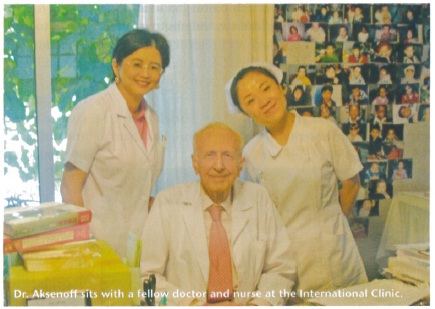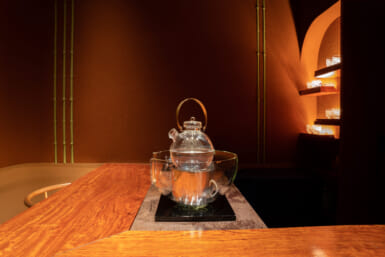Treating struggling families, superstars, and everyone in between since 1954
by Danielle Tate-Stratton
It’s easy to imagine patients visiting Dr. Eugene Aksenoff getting distracted from their ailments if they ever had the chance to ask about his fascinating past. The, as he puts it, ‘white Russian’, was born in Manchuria in 1924 to a Russian father and German-Russian mother who had fled from their home country following the revolution. That interesting start sparked off a fascinating life, which has led to his current prominence on the International medical scene in Tokyo.
When he was eighteen, Dr. Aksenoff and his family had the opportunity to become friendly with members of the Japanese Imperial Family when a representative—then Count Tsugaru, father of Her Imperial Highness Princess Hitatchi, sister-in-law to the Emperor—came to find out about the family’s horses. This friendly connection with the visiting Imperial Family would prove pivotal in the young student’s life.
At the time studying at a French Catholic International School in Harbin and the recent winner of his school’s Japanese speech competition, he hoped to travel to France to study medicine. Unfortunately, right around then the Second World War broke out and he was unable to make the journey. Hearing that, Count Tsugaru suggested he come to Japan to study. As a result, in 1943— during the war—he traveled to Japan and commenced studies at Waseda University, followed by medical training at The Jikei University School of Medicine, then the only English-language medicine program available. He succeeded in finishing his training and after sitting the Japanese exams, obtained his Japanese medical license.
Due to his impressive language prowess—Dr. Aksenoff speaks Chinese, Russian, German, Japanese, English, and Greek—he was quickly hired by the occupying American army to do translation work with General McArthur’s army and also began treating Japanese war criminals from the Sugamo Prison at the 361st Station Hospital.
This friendly connection with the
visiting Imperial Family would prove
pivotal in the young student’s life.
A few years later, Dr. Aksenoff, along with an American Colonel and British surgeon and dentist, opened the Tokyo Medical and Surgical Clinic at the behest of the American Embassy who requested they open a clinic for non-military Americans. The Tokyo Surgical and Medical Clinic is still in operation, in Minato-ku, to this day. (www.tmsc.jp)
After gaining valuable experience both as a practitioner and in regards to the business aspect of running a clinic, Dr. Aksenoff opened his International Clinic in 1954. Of being a foreign businessman running a clinic here in Japan, he remarks: “It was not harder [in Japan as opposed to abroad], and there was no discrimination. I have friends here and I’ve been here for 65 years so I understand it here—not completely, but I understand it. The Japanese people are majime—serious people who work hard and study hard. I enjoy Japan.”
Over the years since its opening, the clinic has made a name for itself in part by treating people from all socio-economic backgrounds. Dr. Aksenoff is rightly proud to say that they have always been flexible in helping foreigners in need, even providing free service on occasion, and have never refused a patient for any reason; not just inability to pay. At the opposite end of the scale, he works closely with several top-level clients including hotels in the area for which he is the doctor sick travelers come to: The Okura, Grand Hyatt, Hilton, and more. Additionally, he works closely with the American Embassy, and has even treated some of the US’s biggest stars as they passed through Tokyo. Some thirty years ago, he performed surgery on the most American of icons—John Wayne, and more recently, has treated such stars as Madonna and Michael Jackson.
The International Clinic, which is staffed not only by the energetic 84-year-old who still works ten hours each day, but also by a Malaysian Doctor with fantastic English, and a Japanese-American doctor who grew up in the US, along with a nurse who trained in Canada.
Together, they provide a unique environment in Tokyo—between them they speak many languages and are always happy to serve traveling clientele as well as foreigners living here. Not only is the bedside manner tailored towards a more Western approach, but the clinic also prides itself on short waits and on using as much foreign medicine as possible so that as patients go home, they are easily able to continue on the same course of treatment. Not only that, their doctors will know about the medications they are on.
It is not only the technical side of things that is a bit different at International Clinic—walking in to the building is a completely unique experience. There is no linoleum and cold white walls in this building! The International Clinic occupies an old house previously owned by The Bank of England. Sitting protected by established trees at the busy Iikura Katamachi Crossing just on the Tokyo Tower end of Roppongi, the pre-1923 building, which survived the earthquake and was not bombed due to its proximity to the US and Soviet Embassies, boasts rich wood floors and paneling and original red stained glass, brought from the UK to Japan.
Overall, the clinic is as welcoming and personable as Dr. Aksenoff, who, although he isn’t actively seeking new patients, promises to stay true to his mantra of never turning away a patient in need. Alternatively, he has a great reputation and relationship with the medical community in Tokyo and is willing to help patients find a doctor best suited to their needs. He is especially able to refer those with specific ailments to the best specialists in whatever area is necessary.
International Clinic
1-5-9 Azabudai, Minato-ku. Tel. 03-3582-2646.









